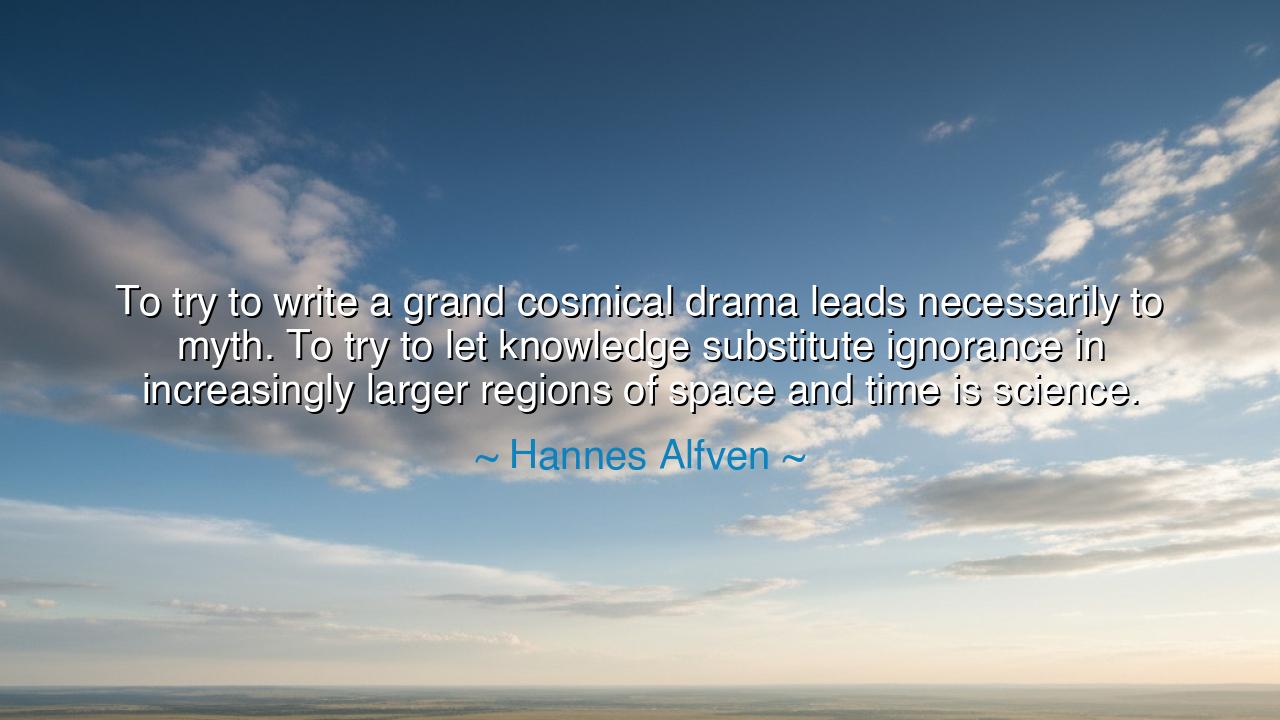
To try to write a grand cosmical drama leads necessarily to myth.
To try to write a grand cosmical drama leads necessarily to myth. To try to let knowledge substitute ignorance in increasingly larger regions of space and time is science.






The great physicist and visionary Hannes Alfvén, a man who gazed into the cosmic depths and found both beauty and order, once said: “To try to write a grand cosmical drama leads necessarily to myth. To try to let knowledge substitute ignorance in increasingly larger regions of space and time is science.” In these words, Alfvén draws a sacred boundary between the imagination of myth and the discipline of science—between the desire to create stories about the universe and the quest to understand its truth. His statement is not a rejection of myth, but a reverent distinction: for where myth speaks to the heart’s wonder, science speaks to the mind’s inquiry. Both spring from humanity’s awe before the cosmos, but only one seeks to replace mystery with understanding rather than ornament it with tales.
The origin of this quote lies in Alfvén’s lifelong journey as a scientist who sought truth in the stars. Born in Sweden in 1908, he lived through an age when human understanding of the universe was undergoing a revolution. He was a pioneer in plasma physics, exploring how charged particles govern the behavior of galaxies and suns. Yet, even as he peered deeper into the workings of the cosmos, he saw how easily mankind turns knowledge into narrative, weaving grand explanations before evidence has spoken. He warned his peers and his students alike that when we attempt to write the “grand cosmical drama”—when we claim to know the totality of creation—we fall back into the realm of myth, not science. For true science, he said, is not the creation of stories, but the substitution of ignorance with knowledge, a patient and eternal unfolding of truth.
Alfvén’s wisdom carries the tone of ancient humility. The earliest humans, standing beneath the infinite night sky, told stories to explain the stars. They imagined gods and heroes battling across the heavens; they gave names to constellations and meanings to their movements. These myths were not lies—they were humanity’s first language of wonder. Yet, as the centuries passed, a new kind of seeker arose: the philosopher, the observer, the scientist. These were the ones who asked not why the gods fought, but what truly is. They replaced the burning chariots of the sun with the fiery orb of a star, the hand of Zeus with the force of gravity. Thus was born the long, noble work of science—the art of unweaving the rainbow to see its light more clearly.
Alfvén’s statement reminds us that these two impulses—myth and knowledge—live side by side in every human soul. Even today, when our instruments can see to the edge of the visible universe, we are still tempted to turn our discoveries into dramas, to cast the cosmos in human form. We speak of “the mind of the universe,” of “the music of the spheres,” of “creation’s design.” These are the poetic echoes of myth that remain within us, for man cannot gaze into the infinite without feeling the pull of story. Yet Alfvén urges us to resist the comfort of mythic certainty and choose instead the courage of inquiry. For science is not content with beautiful explanations—it demands true ones.
Consider the tale of Galileo Galilei, who lived in an age ruled by cosmic myth. The heavens, said the scholars of his time, were perfect and unchanging, with the Earth at their center. To question this order was to defy the divine. Yet Galileo, through his telescope, saw moons orbiting Jupiter, and spots upon the face of the sun. He saw imperfection in the heavens—and in that imperfection, he found truth. His discoveries shattered the mythic drama of a perfect cosmos and replaced it with the knowledge of a living, dynamic universe. The world condemned him for it, but his courage marked the triumph of science over story, of light over ignorance.
And yet, Alfvén does not scorn myth entirely. He knows that it is myth that awakens curiosity, that the stories of gods and stars first stirred humanity to look upward. But myth must be the beginning, not the end. The path of wisdom is to honor myth’s beauty while striving always toward knowledge. For in every age, ignorance waits to reclaim its throne; in every generation, there are those who prefer the comfort of stories to the challenge of truth. The scientist’s duty, as Alfvén teaches, is to expand the realm of the known, to push the darkness back a little farther—not with arrogance, but with patience, humility, and love for the universe itself.
O seeker of truth, remember this: science is the discipline of humility. It does not declare the final word—it whispers, “Let us look again.” It is a lifelong devotion to learning, a recognition that understanding is never complete, only ever deepened. Do not mistake beauty for truth, nor poetry for proof. Yet do not despise beauty either—for it is the spark that begins the search. Let your wonder lead you to study, and your study lead you to wisdom. For to live rightly is to balance myth with reason, heart with mind, faith with fact.
Thus, the wisdom of Hannes Alfvén endures as a torch for every age: that to write the grand cosmic drama is to dream, but to replace ignorance with knowledge is to awaken. Dream, then, but awaken often. Marvel at the stars, but measure them also. And in all your seeking, remember that the truest reverence for the universe is not to imagine it in your image, but to listen to what it tells you—patiently, humbly, and endlessly.






AAdministratorAdministrator
Welcome, honored guests. Please leave a comment, we will respond soon